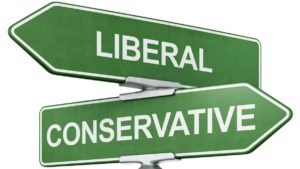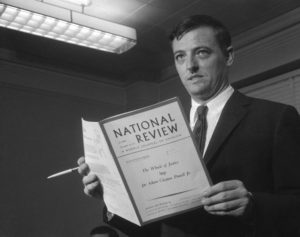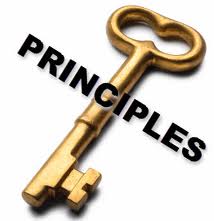I’ve been musing the past few days on the roots of my political and/or governmental philosophy. Why am I where I am today in my understanding of what’s best for the governing of this nation?
I wasn’t raised in a home that taught me what I now believe, so it’s not a matter of merely copying what my parents thought. In fact, I grew up thinking the Democrats were the party to support.
I was conservative as far as I understood what conservatism was, but didn’t grasp the drift taking place in that party. I thought that because I was sympathetic to the civil rights movement, I was a good Democrat.
 It took a conversation in college with someone who knew the difference to show me I was truly a conservative in outlook and that my views lined up better with the Republicans. That actually surprised me.
It took a conversation in college with someone who knew the difference to show me I was truly a conservative in outlook and that my views lined up better with the Republicans. That actually surprised me.
Yet I didn’t just follow the advice of that person blindly. I began to investigate what I should believe and why. Two factors guided my thinking: my growing Christian faith and the influence of certain writers I was beginning to enjoy reading.
First, I began to learn about Biblical principles and how they should be applied to society, including government. Those principles continue to guide me today.
 Second, two periodicals honed my thinking in accordance with those Biblical principles: National Review and The Freeman. The first offered witty and insightful commentary on the current political scene, and I greatly admired William F. Buckley, the founder of the magazine; the second grounded me in free-market concepts.
Second, two periodicals honed my thinking in accordance with those Biblical principles: National Review and The Freeman. The first offered witty and insightful commentary on the current political scene, and I greatly admired William F. Buckley, the founder of the magazine; the second grounded me in free-market concepts.
When I decided to pursue my doctorate in history, I was in a time of uncertainty spiritually. I was searching to see if anything else could fill that void. My professors, generally speaking, were far more liberal than I, and some of the reading I was given allowed me to test my convictions. Would they stand?
They did. I was now grounded in what liberals thought, as I expanded my understanding of both worldviews.
My advanced degrees offered no answers for life; God mercifully drew me back to Himself. Yet that pursuit of higher education did prepare me to better define what I believed and why.
My path to what I believe is not everyone’s path, by any stretch. My spiritual quest combined with my educational quest to make me what I am. It was a fascinating integration of intellectual and emotional satisfaction.
 I have been in higher education circles ever since. Seven of my years of teaching were at the graduate level; another five at a college that stressed classical education.
I have been in higher education circles ever since. Seven of my years of teaching were at the graduate level; another five at a college that stressed classical education.
In my courses, I try to communicate to my students a worldview that is spiritually and intellectually sound.
I’ve always approached politics from this foundation of Biblical principles and solid reasoning from a well-grounded conservative philosophy. I don’t repent of any of this, but I do think my approach has left me a little bewildered by the politics of 2016.
As I meditate on what has developed politically over the past year, I have been astounded by what seems to me to be a devastating loss of principle in both the Christian world and the corresponding conservative world.
 I’ve been trying to understand why this is so. You see, for me, the first time I saw Donald Trump on the stage with all those other candidates, I came away thinking that this was the biggest con of recent political history and that no one would take him seriously. Why? Because I didn’t perceive him as a serious candidate.
I’ve been trying to understand why this is so. You see, for me, the first time I saw Donald Trump on the stage with all those other candidates, I came away thinking that this was the biggest con of recent political history and that no one would take him seriously. Why? Because I didn’t perceive him as a serious candidate.
Trump had no command of the issues. He was an egotist who blustered, interrupted, and insulted anyone he thought was in his way. His entire history was as a liberal Democrat, and now he was trying to convince everyone he was a Republican.
I thought everyone would see through this charade. I’ve been sorely disappointed.
True, he didn’t get the majority of Republican votes in the primaries. I console myself with that fact. But once he became the nominee, so many who had previously said he was unacceptable suddenly decided he was now worth supporting, and anyone who disagreed should be shamed and guilted (is that a word?) into abandoning their principles and declaring their undying allegiance.
My entire background and training doesn’t allow me to board this train. I’m dismayed that so many others have decided to do so.
 I’ve learned a valuable lesson, though. I have to realize that not everyone makes decisions based on principles only. Sometimes emotions carry the day. The emotion that leads some to vote for Trump now is fear—fear of a Hillary Clinton presidency.
I’ve learned a valuable lesson, though. I have to realize that not everyone makes decisions based on principles only. Sometimes emotions carry the day. The emotion that leads some to vote for Trump now is fear—fear of a Hillary Clinton presidency.
I understand that fear. What I don’t get is why those same voters don’t see the danger of a Trump presidency as well. In my view, both are equally undesirable.
Some probably wonder why I continue to warn about Trump when it is clear that one or the other—Trump or Hillary—will be the next president. The answer is this: I’m looking beyond this election; I’m trying to keep us thinking about what comes next and whether there will be a Christian witness left to the nation after this, and whether there will be any conservative movement to build upon and salvage the disaster that is sure to come regardless of who wins this particular election.
We need to be principled people. My task, I believe, is to stay true to that calling and convince as many others as possible to do the same.
